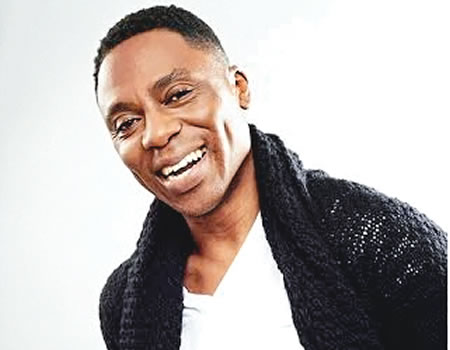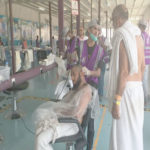Tell us about your background
I was born in England. Then I came for secondary and university education in Nigeria. I studied history at the University of Lagos before travelling back to the United Kingdom to study fashion. I started my business in 1991.
Why did you decide to venture into fashion as a career ?
I have always been interested since I was young, as far back as I can remember. I used draw a lot. I was fortunate to have parents who encouraged me, got me loads of papers and fashion magazines. So, that was what inspired me. My mum insisted that if I wanted to become a fashion designer, I had to go and study it.
Many people have different definitions of fashion. What is yours?
I would say fashion is an expression of oneself, what you like to wear. A lot of people’s character and idiosyncrasies can be observed through the things they wear – the colour, textures and fabrics.
Many have great stories while interning or learning at a fashion school or somewhere else. What was your apprenticeship like?
I interned at two fashion houses. They are both couture designers and they used to make outfit for people of high social class. It was a tremendous experience. It gave me the ability to meet people. I was able to relate with styles. As for the business side of it, dealing with clients, I learnt to deal with clients effectively. Whether we like it or not, fashion is a business. Fashion is a passion. It is a business and a not a hobby. It has its own set of principles you have to adhere to.
Asides skills, what other things did you learn while interning at those fashion schools?
I learnt that it is very important that you get experienced because it makes you aware that you cannot work in isolation. You have to work as a team. So, I learnt team work, being humble and observant.
What is your favourite aspect of fashion?
Designing, creating fashion ideas.
Talking about fashion ideas, do you think it is necessary to opt for foreign concepts?
No. Getting an idea as a fashion designer is innate. You could take it further by getting some form of formal training. There are loads of fashion school here in Nigeria. There is also Yabatech. I think, in Akure, there is a sort of fashion place. When I’m asked, I say to people that you can be an apprentice and as an apprentice, you still study a lot. But what you mustn’t do is to assume that because you like clothes and you love fashion, you now open a fashion house. I don’t think it works like that. It is only when you’ve got the formal training with a fashion school that you will learn all those skills that will be valuable to you later in life.
What inspires your designs?
A designer called Karl Lagerfield said he is inspired a collection of everything he sees around him. That really works for me. I am inspired by architecture, colour, fabrics, texture, name them.
What skills are necessary for one to be successful a fashion designer?
I feel it is important to be able to come up with ideas. Just like a musician, people look forward to hearing new tracks. I think creativity is crucial. You also have to be tenacious and passionate. There are other avenues for making quicker money but if you are going into fashion designing, you may not make it too soon. The dividends are there but you have to be passionate and enduring about the craft. Also, it is not easy dealing with people, coming up with ideas and having to sell them to people.
How did your breakthrough happen?
My story is unique. I was a successful student in school. I won a lot of awards while in school in Manchester, London. I won a lot of awards for the school I attended and then coming out, I started my business a year after. Because I was also a designer of colours and there were not too many black designers in England, there was a lot of attention on what I was doing. I was fortunate to be located in the central part of London. It is like the Ikoyi of Lagos. So, I had access to a lot of well-paid clients. So the start was sort of quite easy but it was how to sustain it that became an issue. I wanted to expand more. So, at some point, I sort of scaled the business down and travelled to make more enquiries in America, trying to see what I could do there. But the feedback was to go back and do what I was doing before. No business started easy. There was a time I was going to fashion houses in Paris and I was told that I still had to go back and develop my own label. With all that advice, I went back and continued. A lot of fashion houses worldwide do have financial backups but I never had. I always re-invest back my money into the business.
How do you do this ?
Well, I re-invest my gains into the business (laughs). This is because it is priority to me. This demands being self-disciplined and principled to caution unnecessary spending.
How would you describe your personal style?
Oh, very conservative. I like wearing black.
What informed this style?
I discovered that I have to be simple yet very unique in a way that I can be associated with a particular thing.
Who was your first Nigerian client?
It was a friend. When she was getting married, she asked if I could design her wedding dress. I told her no, I don’t design wedding dress. She said, “When you were in London you won a bridal fashion award and I am sure you can do it.” I agreed and so, she was our first Nigerian client.
What would you have been if not a fashion designer?
I would like to have worked in the foreign affairs department. I like the idea of travelling, meeting people and trying to understand other cultures.
What is your assessment of the fashion industry in Nigeria?
The Nigerian fashion industry is very vibrant. There are lots potentials here and the whole work is now focusing on Africa especially Nigeria because the youth population here is vast. The sad thing is that much of these talents are not harnessed because a lot of them don’t study fashion. People wake up and post pictures on Instagram. So, there is a huge influx of that. That is not the way to do it. What we should do is to have more fashion schools. In England, there are 600 government schools for fashion and that is not even talking about the private ones. But in Nigeria, I don’t think we have more than ten government schools. More schools should be established. So, a lot of universities should now start looking to have Department of Fashion where students can be trained to becoming fashion designers. England has been awarding degrees in fashion design since 1950. That is why they are more developed in what they do and why they make more money.







